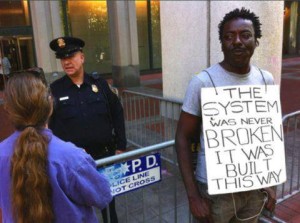Justice Theater
By Dave Hitt on Mar 26, 2015 in Big Brother, Police State
To outward appearances, the US has one justice system that serves everyone. But if you pay close attention, you’ll see that it’s a two-tier system which operates differently depending on who is being processed through it.
Tier 1 is reserved for police officers. (Politicians and the very wealthy may also receive Tier 1 treatment, although that is not guaranteed.) The goal of Tier 1 is to protect cops from being prosecuted or convicted. The rest of us, The Little People, AKA you and me, always get Tier 2, where the goal is a conviction.
Little People are subject to tens of thousands of laws, rules and regulations,. Violating any of them can lead to us losing our money, property and/or freedom. It’s estimated that, peacefully going about our business and harming no one, we commit three felonies a day, along with dozens of misdemeanors.
The police have a much simpler set of rules:
#1) You can do anything you want to the Little People, up to and including murder.
#2) Never say anything even slightly critical of your fellow officers, or we’ll turn you into one of the Little People.
#3) There is no number three. One and two are pretty much it. They do have lists of rules and regulations, but they’re just props they wave around as part of the show.
When a cop’s violence attracts public attention, it’s time for some Justice Theater. The story’s ending is predetermined; the prosecutor only decides the length of the show.
They prefer a one act play. The cop is given a paid vacation. The police investigate themselves, and justify whatever happened. The prosecutor declines to press charges, and the show is finished.
If the public is in a foul enough mood over the incident, he’ll add Act II: The Grand Jury.
The Grand Jury was designed as a check of government excess. In practice they serve as a prosecutor’s rubber stamp. Â As an experienced attorney explains, “…the adage that a grand jury will indict a ham sandwich is an understatement. A better description would be that the prosecution can show a grand jury a shit sandwich and they will indict it as ham without looking up from their newspapers.” Â The prosecutor usually wants an acquittal, and they always give him what he wants. If anyone complains about the results, most of The Little People chant, “But he was cleared by a grand jury!”
Very  occasionally. if there is a huge public outcry, the prosecutor decides to put on a three act play. He’ll procure an inditement from the grand jury, then stage a show trial.
occasionally. if there is a huge public outcry, the prosecutor decides to put on a three act play. He’ll procure an inditement from the grand jury, then stage a show trial.
First a jury is carefully hand-picked to insure a “not guilty” verdict. Then the show begins. The jury and the rest of us Little People are treated to masterful performances, full of carefully tailored evidence and objections and raised voices and show and tell. It’s all impressively dramatic as it works it’s way to the inevitable, predictable, finale: the officer is declared Not Guilty.
And most of the audience claps and cheers in appreciation of the fine Justice Theater they’ve just witnessed. It doesn’t matter if it’s one, two or three acts, most Little People unwaveringly support the police, and will point to the performance as proof of the cop’s innocence.
Very, very occasionally, about as frequently as a poker player is dealt a royal flush (once out of every 649,739 hands) a cop will be convicted of a crime. Defenders of the status quo say, “See, the system works!†They’re wrong. A cop being convicted is a system failure – it’s just not supposed to happen. But when it does, it’s time for the encore: extremely lenient sentences. When a cop commits a crime that would cost one of us Little People twenty or thirty years of our life, he’ll usually get two, maybe three years. It’s the way the system apologizes to him for accidentally getting a conviction.
When you see the endless stories of cops getting away with murder over and over and over and over and over again, be outraged. Be disgusted. But don’t complain that the system is broken. It’s not. It’s working exactly the way it was designed to.
Post a Comment